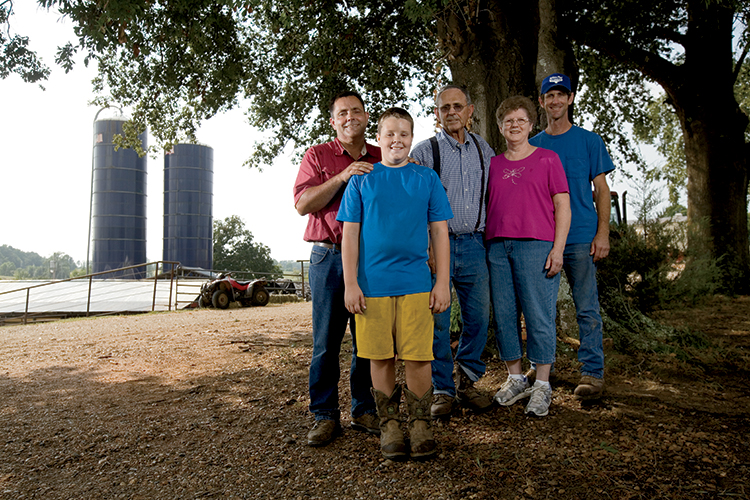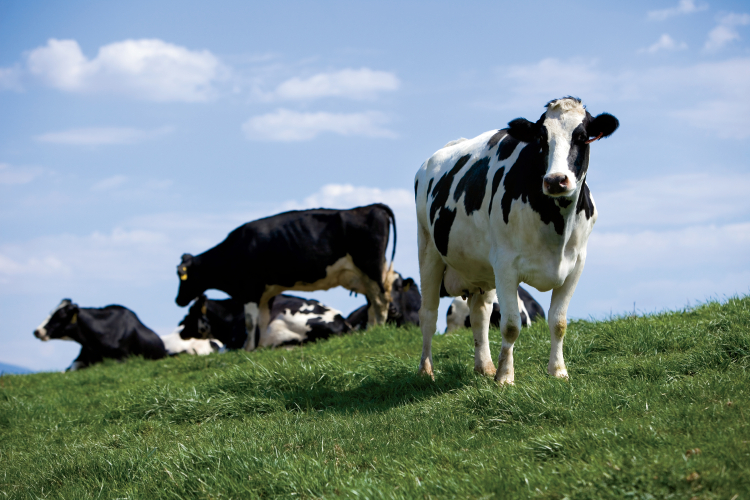Home > Arkansas > Arkansas Farm to Table > Arkansas Centennial Farm Prospers
Arkansas Centennial Farm Prospers
Brothers Marvin and Richard Helms can be found most days tending to their herd of 325-plus cattle on Helms Dairy Farm in Arkadelphia, a practice that has been passed down from one generation to the next.
“We’re proud to be farmers,” Marvin Helms says. “I just love to farm and I love cows.”
Originally founded in 1907 by the Helms’ grandfather, today the farm is thriving thanks to the brothers’ willingness to stay ahead of the times. The brothers also grow their own corn for silage and grain to feed their cows.
“We have been selling Grade A milk since 1949. We increased the original 200 acres my grandfather had to more than 1,500 acres,” Marvin Helms says. Farming is a tradition both brothers would like to pass on to their own sons. When the dairy was first in operation, the milk was separated and the cream was sold. I
n the later years, when the milk was cooled in vats filled with cool water, it was then delivered to the cheese plant. These days, the milk is packed into a 3,000-gallon refrigerator tank and a refrigerated tanker truck picks up the milk and carries it to the milk plant.
“From time to time we have changed things up,” Marvin says, such as installing a waste management system in 1993 that pumps water to the pasture to help in fertilization. “By increasing the number of cows this year and increasing production, we hope to produce over 3.5 million pounds of milk this year.”
The Century Farm Program
In 2013, Helms Dairy Farm qualified for the Arkansas Century Farm Program, which recognizes Arkansas’s rich agricultural heritage and honors families who have owned and farmed the same land for at least 100 years.
According to Cynthia Edwards, deputy secretary for the Arkansas Agriculture Department, all Arkansas Century Farm Program farms must have been owned by the same family for 100 years or more, must be 10 acres or more of the original farm, and must make a financial contribution to the overall farm income.
“In our first year, we had 83 farms qualify. We had even more interest this year, with 102 achieving the Century Farm Program distinction,” Edwards says. “They receive a special certificate and get a personalized metal sign with their farm name on it at a special presentation.”
Industry Challenges
There have been some rough times for the dairy industry in Arkansas of late, with decreasing production and fewer operations across the state.
“As the number of dairies continues to decline, transportation cost will increase due to the distance trucks will have to travel between dairies across the state,” says Mike Fisher, chairman of the Arkansas Milk Stabilization Board. “More milk will be coming from out of state to meet the processing needs, making them less dependent on the local producers’ milk. This will lessen the bargaining power of the local producers.”
Still, dairy remains a valuable industry to the state, with annual receipts from milk sales coming in at approximately $27 million in 2012.
An active dairy farm can stay productive in today’s times, Fisher says, by putting the herd on a monthly Dairy Herd Improvement program, starting an artificial insemination program using the top bulls in the breed and raising as much feed as possible on the farm.





